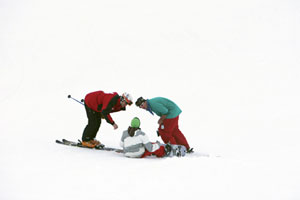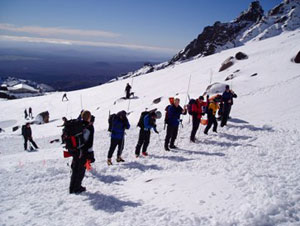Ski Field Patroller
Tasks & duties

Ski field patrollers may do some or all of the following:
-
assess and report on weather conditions
-
monitor avalanche risk by taking snow samples and assessing snow stability
-
manufacture and use explosives to set off avalanches where the snow is unstable
-
prepare the ski field for skiers and snowboarders by putting up fences and signposting rocks, ice and go-slow areas
-
ensure first aid, communication and avalanche control equipment is ready for use
-
educate skiers and snowboarders on mountain safety
-
stop people who are skiing or snowboarding recklessly
-
attend accidents and give first aid to injured people
-
tow injured people to the ski field's medical centre in a toboggan
-
lead or take part in rescue operations
-
check no one is left on the ski field at closing time
-
guide skiers and snowboarders around the ski field or beyond the snowsport area
Skills & knowledge

Ski field patrollers need to have:
-
knowledge of accident prevention and avalanche control
-
an understanding of the operational aspects of the ski field where they work
-
expertise in assessing weather, snow and mountain conditions
-
good skiing or snowboarding abilities
-
good first aid skills
-
excellent leadership, communication and people skills
Climbing, mountaineering and rescue skills may also be useful.
Entry requirements
To become a ski field patroller, you need to have advanced skiing or snowboading skills. Most snowsport patrollers are skiers, but some snowsport areas employ snowboarders who have expert-level snowboarding skills.
You also need to complete an Avalanche Safety Stage One training course and a Pre-Hospital Emergency Care course approved by the New Zealand Mountain Safety Council. The length of these courses vary from three to six and a half days, depending on the employer.
Some snowsports areas may have further requirements.
Secondary education
There are no specific secondary educational requirements, although School Certificate or NCEA equivalent is recommended. Useful subjects include English, geography and physical education.
Tertiary education
Ski field patrollers can get training and work experience through one of two ski patrol pre-employment certificate courses.
In the North Island, a partnership programme run by the Sir Edmund Hillary Outdoor Pursuits Centre and Ruapehu Alpine Lifts offers a certificate programme at the Whakapapa snowsports area.
In the South Island, the Mountain Education Centre of New Zealand at the Tai Poutini Polytechnic offers a certificate programme in Wanaka.
Training on the job
Many skills are learned on the job and most snowsport areas offer training courses on a wide variety of topics. These often include learning about:
-
driving snowmobiles
-
knots
-
snow safety
-
avalanche transceivers (to locate people buried by avalanches)
-
medical skills
-
using toboggans
-
mountain craft
Useful experience
Experience working as an outdoor or mountain guide is useful. Also, any work at snowsport areas can be helpful, including experience working with the public.
For more information, please refer to Career Services.
Document Actions
